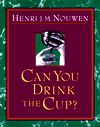
When Jesus asks his friends James and John, the sons of Zebedee, "Can you drink the cup that I am going to drink?" he poses the question that goes right to the heart of my priesthood and my life as a human being. Years ago, when I held that beautiful golden chalice in my hands, that question didn't seem hard to answer. For me, a newly ordained priest full of ideas and ideals, life seemed to be rich with promises. I was eager to drink the cup!
Today, sitting in front of a low table surrounded by men and women with mental disabilities and their assistants, and offering them the glass cups of wine, that same question has become a spiritual challenge. Can I, can we, drink the cup that Jesus drank?
I still remember the day, a few years ago, when the story in which Jesus raises that question was read during the Eucharist. It was 8:30 in the morning, and about twenty members of the Daybreak community were gathered in the little basement chapel. Suddenly the words "Can you drink the cup?" pierced my heart like the sharp spear of a hunter. I knew at that moment--as with a flash of insight--that taking this question seriously would radically change our lives. It is the question that has the power to crack open a hardened heart and lay bare the tendons of the spiritual life.
"Can you drink the cup? Can you empty it to the dregs? Can you taste all the sorrows and joys? Can you live your life to the full whatever it will bring?" I realized these were our questions.
But why should we drink this cup? There is so much pain, so much anguish, so much violence. Why should we drink the cup? Wouldn't it be a lot easier to live normal lives With a minimum of pain and a maximum of pleasure?
After the reading, I spontaneously grabbed one of the large glass cups standing on the table in front of me and looking at those around me--some of whom could hardly walk, speak, hear, or see--I said: "Can we hold the cup of life in our hands? Can we lift it up for others to see, and can we drink it to the full?" Drinking the cup is much more than gulping down whatever happens to be in there, just as breaking the bread is much more than tearing a loaf apart. Drinking the cup of life involves homing, lifting, and drinking. It is the full celebration of being human.
Can we hold our life, lift our life, and drink it, as Jesus did? In some of those around me, there was a sign of recognition, but in myself there was a deep awareness of truth. Jesus' question had given me a new language with which to speak about my life and the lives of those around me. For a long time after that simple morning Eucharist, I kept hearing Jesus' question: "Can you drink the cup that I am going to drink?" Just letting that question sink in made me feel very uncomfortable. But I knew that I had to start living with it.
This book is the fruit of having done that. It strives to
make Jesus' question pierce our hearts so that a personal answer can emerge from there. I will follow the three themes that emerged that morning in the Dayspring Chapel: homing, lifting, and drinking. They will allow me to explore the spiritual horizons that Jesus' question opens for us and to invite you who will read this to join me in this exploration. - (From the Introduction)